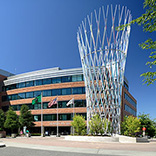


The application for the 2024 Pathways Research Explorers Program is closed.
Join us for a fun, two-week introduction to Fred Hutchinson Cancer Center (Fred Hutch) and the research being conducted here. Fred Hutch has an international reputation for its pioneering research in bone marrow and stem cell transplantation and other immune-based cancer therapies. We also are well-known for our work in many other areas of biomedical research, including cancer prevention, public health, epidemiology, and biostatistics. Participants will conduct hands-on activities in Fred Hutch's training labs, tour working labs, meet students and scientists at different stages of their careers, and talk about next steps you can take if you are interested in biomedical research.
This program is open to all students. We especially encourage applications from individuals furthest from opportunity, as described by NIH's Notice of Interest in Diversity.
Please note that there are two sessions offered. Each two-week program meets from 9 - 4 p.m., Monday - Friday.
2024 Program Dates
- Orientation Day: June 2024, Date TBD, 6 - 8 pm
- Session 1: July 29th - August 9th, 2024, 9 am - 4 pm
- Session 2: August 12th - 23rd, 2024, 9 am - 4 pm
Check out the Blog Posts from our previous Explorers students!
2024 Application Timeline
- Application opens January 2024
- Application closes 11:59 pm PST March 24th, 2024
- Recommendation form is due by 11:59 pm PST March 31st, 2024
- Notification of applicant status will go out late-April 2024
Students should...
- Be starting 10th or 11th grade in the fall
- Have completed introductory biology
- Be interested in learning more about cancer research and related careers
Applications for the 2024 Pathways Research Explorers Program is now open. Applicants must complete an application, obtain a recommendation from a teacher who can speak to the student's science interest, and submit an unofficial transcript before 11:59 pm PST on March 24th, 2024. To view a preview of the application download this PDF. The PDF is the preview of the application and not the actual application. Please DO NOT fill out the preview and submit it in place of the online application.
Please note that you cannot save an application that you have partially completed. Therefore, we recommend you draft your short answers in a word processing application such as Word or Google Docs before starting the application, and then copy them into the form when you are ready.
Notification of applicant status will be sent out late-April.
There is no cost to attend although students will need to bring/buy their own lunch and make their own travel/lodging arrangements.
After successful completion of the program, students will receive a $500 award to offset lost work opportunities.
2024 National Minority Health Month Op-Eds by the Explorers Virtual Interns
These op-eds were written by the Science Education Partnership Virtual Explorers High School interns for the April Minority Health Month Programming held by the Employee Resource Groups (ERGs) at the Fred Hutch (the Community of Employees for Racial Equity, Fred Hutch Rainbow Employees for Equity, and Hutch United) in partnership with different departments (Government and Community Relations and Science Education). Each op-ed focuses on the groups and communities that are the focus of each week.
The Virtual Explorers Internship at Fred Hutch is made possible by Pathways to Cancer Research (R25CA221770), a Youth Enjoy Science Award (YES/CURE), from the National Cancer Institute (NCI) at the National Institutes of Health. The contents are solely the responsibility of the author(s) and the Fred Hutch Science Education Partnership and do not necessarily represent the official views of the NCI or NIH.
Indigenous and Alaska Native Health Week: Addressing the Persistent Disparities in American Indian and Alaska Native Communities by Etasha Thareja, Chloe Sow, and Beza Mersa
Native Hawaiian and Pacific Islander Week: Addressing Disparities in the Healthcare Field Towards Native Hawaiians and Pacific Islanders by Minal Gowda and Belen Sime
Black and African American Health Week: The Voices of African Immigrants by Yodahe Maaza
Latinx and Hispanic American Health Week: Language: Both a Bridge and a Barrier by Andy Mejia, Betul Orhan, Miah Morales, and Melodie Duran
2023 Op-Eds:
Week 0: Health Inequities: Attacking Health Disparities Through Social Determinants by Melodie Duran, Chloe Sow, and Ikran Abshir
Week 1 - Indigenous and Alaska Native Health Week: Indigenous and Alaskan Native Mental Health by Taylor Neil and Raihan Hakim
Week 2 - Latinx and Hispanic Health Week: Multilingual Practices in Healthcare by Andy M, Aaliyah B, and Lalitha C
Week 3 - Black/African American Health Week: The Generational Scar by Faduma Yusuf and Mahelat Alamerew
Week 4 - Native Hawaiian and Pacific Islander Health Week: Diabetes in Native Hawaiian and Pacific Islander Groups in the US by Benjamin Pham, Etasha Thareja, and Sebastian Gurrero
Other Pathways to Cancer Research Programs

Hutch Teacher Fellowship
Hutch Teacher Fellowship
The fellowship provides a two-year professional development research experience for secondary science teachers.
Learn More
Pathways Undergraduate Researchers
Pathways Undergraduate Researchers
Pathways Undergraduate Researchers is an individualized, mentored, summer internship program for rising first-, second-, and third-year college students. The program aims to prepare students for upper-level undergraduate research training programs.
Learn MoreThe High School Pathways Research Explorer Program is a part of Pathways to Cancer Research and is funded by a Youth Enjoy Science (YES) grant from the National Cancer Institute (grant number R25CA221770). Funded by the National Cancer Institute, Pathways to Cancer Research provides education and training programs for teachers, high school students, and undergraduates. This builds on the long-standing efforts and institutional commitment by Fred Hutch to support the development of a more diverse next generation of biomedical scientists. Pathways to Cancer Research materials are solely the responsibility of the authors and do not necessarily represent the official views of the NCI or NIH.
